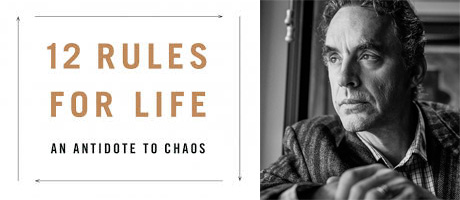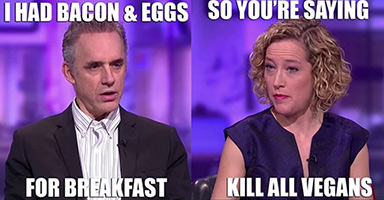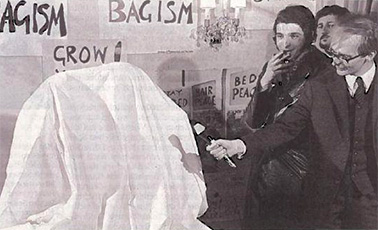

Review of Jordan Peterson’s 12 Rules For Life
A Spoonful of Sugar Might Help This Medicine Go Down
By Ken Eckert
March 11, 2018
Two or three years ago, I probably would hesitate to write this review, even considering the two or three bored people max who might read it. Dr. Jordan Peterson has had his office at University of Toronto vandalized and career and personal safety threatened for his opinions. A few nights ago at a book reading at Queen’s University in Kingston, Ontario, social-justice students and progressive advocates violently protested his lecture and a woman was arrested for smashing through a window carrying a rope-device for strangling. This is in Canada, where we apologize for apologizing too much. A grad student at Wilfred Laurier was prosecuted for showing one of his videos in a class.
No matter your views on Peterson, unless you see universities as just the disposable host for a radical agenda’s achievement, this is not good. This is not sustainable. Humanities departments are by the nature of the beast liberal arts. But if classes become little more than consciousness-raising and interrogation sessions, and if campus mob violence is allowed to be the norm until it inevitably, eventually, results in deaths– the chorus of taxpayers and politicians questioning “why do we fund this crap” will do something about it, just as many bright young students already are in voting with their feet and avoiding humanities programs.

No wonder Peterson ends his book saying of his life “Things are good. For now.” Is it wise for me to say anything in 2018? But in a way, the Ursula-sized monster of political correctness and jackboot identity politics might die in part because of the old adage that you might as well get hung for a pound as for a penny. Who isn’t guilty now of something *-ist, anyway? I’m already damned by many people with power simply for being a Christian white male. So what difference, at this point, would a blog post saying nice things about Jordan Peterson’s book make? It’s rather like the prisoner in Life of Brian who says “Jehovah,” because at this point, why not? I also live in Korea and could be atom dust next week. So I have that going for me, which is nice.
Jordan Peterson is already the savior of western civilization or an obscene avatar of the heteronormative patriarchy, however you look at it. He became famous for recently refusing to comply with an Ontarian law mandating that people’s chosen gender pronouns be used by others. Peterson is dubious about the science of gender as a fluid construct, though in fairness to him, his objection is to “compelled speech” and not the content, arguing that he wasn’t opposed to using alternative pronouns if asked, but resented a government dictating what he must say, let alone what he can’t. The other incident which is presently blowing up to Gangnam-Style size hits on YouTube is his British interview with Cathy Newman, where Newman lazily misrepresented Peterson’s views, hoping he’d just lose his temper and rage like an alt-right bully, and he didn’t– instead, Peterson was robotically cool and Newman looked ridiculous, becoming a social media meme herself.

The other thing one immediately notices about Peterson, or at least I did, is that he looks pretty... intense. I wanted to find a photo of him where he doesn’t look like he’s going to bite you. Maybe that’s irrelevant, but to me the eyes are the window to the soul; people like Martin Shkreli or Richard Dawkins rather advertise their douchiness or nastiness, respectively, with their facial appearances. Peterson does have a sharp, intimidating appearance in photographs, and this might help or hinder acceptance of his ideas. On one hand, I can understand the rather clinical coldness of his book. There are multiple reasons: It’s likely his temperament and occupation as a psychologist which gives him a dispassionate feel; and as seen in the Newman clip, he probably wishes to avoid being overly emotional, and a touchy-feely 12 Steps for the Chicken-Soup Soul book is no better than being a stormtrooper; he is a native Albertan like me, and Canadians usually aren’t American-Idol weepy types who air out our emotions; and finally, there are people who (literally) want him dead, and he can be forgiven for being protective about his personal feelings. On the other hand– a little more self-deprecating playfulness in his book might make more friends.
But the surprise about the book, 12 Rules for Life: An Antidote to Chaos (2018), is that it isn’t really about gender politics or politics generally, although identity issues are alluded to in Chapter 11. And although Peterson still isn’t Mr. Warmth, he does at times reveal himself to be a human being when he discusses a childhood friend who kills himself, or his grief as a parent over his daughter’s health issues. Not everyone who writes a book cares about people, but I think Peterson does. Mostly, 12 Rules is about, well, the rules. It is an important book. It is certainly the deepest book I have read in many years. You must read this.
The ‘Rules’ themselves, many of which come from Peterson’s psychiatric practice or short stint on Quora (before, unfortunately, I’d really discovered the site), sound a bit random, like Malcolm Gladwell’s odd essay topics about ketchup or Ronco products: 1. Stand up straight with your shoulders back; 2. Treat yourself like someone you are responsible for helping; 3. Make friends with people who want the best for you; 4. Compare yourself to who you were yesterday, not to who someone else is today; 5. Do not let your children do anything that makes you dislike them; 6. Set your house in perfect order before you criticize the world; 7. Pursue what is meaningful (not what is expedient); 8. Tell the truth, or, at least, don’t lie; 9. Assume that the person you are listening to might know something you don’t; 10. Be precise in your speech; 11. Do not bother children when they are skateboarding; 12. Pet a cat when you encounter one on the street.
 Dogs are fine, too– or frogs, it seems.
Dogs are fine, too– or frogs, it seems.
Reading this list, one is struck that the people who hate Peterson probably haven’t and won’t read the book– for the rules themselves don’t actually seem very heretical. If anything, they feel tame and blandly common-sensical, like the advice your grandparents would give you: Choose your friends carefully, plan for tomorrow, stop slouching. It’s less popular to tell a self-absorbed society to get your own head on straight before you tell everyone else what to do, but still more crotchety than inflammatory. But digging deeper, the hows and whys for these rules understandably will rankle many on the left and right. Being a psychologist, Peterson tends to analyze human motives in a Jungian way, as an attempt to make software work with hardware. He argues: We have been male and female for over one billion years, before we were human, before we were mammals, before we were multicellular– and anyone claiming we can defeat this hardwiring in our brains is a fool. People see things in instrumental terms; we need some danger and risk-taking to grow; men have balanced instincts for both competition (for women and position) and cooperation (for friends and security); women are choosier than men in choosing mates because they carry the burdens of childbearing, and are drawn to able, competent men.
A century ago these maybe weren’t so controversial ideas. They are nowadays in their implications. A progressive might read the claim of psychological tendencies as merely excuses for socialized expressions of power which can be overcome. Saying our cultural values are evolutionarily determined doesn’t excuse us from trying to rectify them or minimize their injustices, and even if they are determined (and some question the science) there’s a certain self-serving fatalism to implying that your brain is programmed through the millennia to do x, and so give up trying to be different. Peterson might counter (as with Newman) that “I didn’t say that.” Fair enough– but this could be navigated more clearly. Equally on the right, Peterson’s logic suggesting that our ethics and morality also merely follow our fixed and programmed biology is discomfiting to conservatives as well; for if so, our values are not even necessarily true or good, they just are as an accident of evolutionary history, and might have been otherwise.
My own church denomination is currently very interested in Peterson, and is discussing whether he might be verging on Christian apologism in his book. Admittedly, in 2018 when someone begins to discuss scripture in an academic-ish book, a Christian’s first instinct is to wince as if expecting a blow, for usually what follows is verses cherry-picked in order to mock them. No wonder the faithful are relieved and curious whether this is a fellow-traveler. Peterson is strangely respectful of biblical scripture– weirdly respectful (and holy writings from other faiths as well). He analyzes the Genesis creation narrative seriously, arguing that it reveals important truths about human questions of morality and meaning encoded in the story. This needs to be qualified, though– not least because Peterson is frustratingly (and maybe intentionally) clear as mud about his own faith position, and apparently believes in “something” but isn’t a Christian; but because he begins and ends his interpretation of scripture psychologically. He argues that because ancient cultures viewed males as broadly symbolizing order and hierarchy (but also possible stagnation) and females as symbolizing growth and fertility (but also possible chaos), the serpent (because our chimpanzee ancestors feared literal snakes and our brains remember) chooses to tempt Eve. Later on, Cain kills Abel, serving as a symbolic explanation of the moral problem of free will; the development of the understanding of free will includes not only seeing that bad things happen, but also consciousness of suffering as something one can choose to impose on others– which is worse.
Now, most Christians outside the U.S. (as did many of the ancient church fathers) see the six-day creation narrative as allegorical. But when Peterson also views Christ and other scriptural narratives as merely symbolic narratives conveying cultural truths, he enervates them as being actually true. God and Christ become functional tools for expressing deeply held attitudes, and stop, well, really existing. To an atheist, well and fine. To a believer, not well or fine– Abraham Lincoln not only represents something, but also actually lived, and that’s kinda important. Evidently Peterson has a conscience, for he does seem to feel that evil is bad and not just a relative position, and that a philosophy which approves of life and wants to improve it for everyone is better; yet some of his advice feels instrumental, that people should have meaning and purpose in their lives because biologically they will thrive with it, not because any particular meaning or purpose is the right one. Perhaps Peterson might say I haven’t read him closely enough– or perhaps he does not see this point himself. So what can a Christian do with this? I have the sense that perhaps Peterson, who is not so old, might also not be finished working out this idea. He may be a C.S. Lewis in the making, who at one point realized that if the world is unfair, that he must have obtained the standard to measure it against somewhere else; or he may be an Aldous Huxley, who realized that materialistic science wasn’t enough, but ended up finding spiritual answers in New Mexican deserts with peyote and LSD. A Christian might wish Peterson took the equation further, to say that if we have morals because of our brain evolution, that perhaps our brain evolution took such a course for a directed reason higher than us. He may or may not someday.
Equally, Peterson hates postmodernist ideology, calling it a rebranded Marxism after French academics refused to see that communism was a spectacularly bloody failure. Yet it’s not always so clear whether that’s because he feels it’s essentially wrong (he does find much postmodernist thought anti-human, intellectually arrogant, and unfairly anti-male) or because it merely tries in futility to socialize or regulate away the realities of our evolutionary brains. I teach postmodern literature myself, and wonder momentarily whether Peterson hates me– though my teaching is about postmodernism as an artistic approach in literature, and I don’t believe that all truth(s) is/are a social construct of power, and I certainly don’t compel my students to believe it, any more than I would require them to live out dadaism or John and Yoko’s bagism. Peterson has taken some flak for being concerned about young men, and somewhat channels the Promise Keepers movement, albeit secularly; he frets that academia and western society have become vehemently anti-male, essentially pathologizing masculinity. In his view, this is no good for anyone, for men who grow up frustrated for being what they are become attracted to harsh Fight Club-style activities or politics (see Trump and alt-right)– and it is no better for women, who are told they are completely self-sufficient but crave companionship, and find that there is a world of kidult men who’ve resigned from ambition or, in one of Peterson’s favorite terms, lack competence.

Fighting words, for many people I know, or went to college with. No wonder people see him as dangerous. I don’t necessarily agree with all that Peterson says. How do I evaluate the book, in summary? I have already touched on several weaknesses. Because Peterson is a psychologist he tends to interpret everything though that single lens, like a hammer viewing everything as a nail. The danger in this is the Specialist’s Hubris, the expert who believes he or she is an expert in every field as a result. Freud’s theory in Totem and Taboo that men invent God because they feel guilt for killing their father in order to mate with their mother is ludicrous; but so is Peterson’s positing (with the qualification that it is only supposition) that ancient man developed God as a reward and punishment motive for delaying momentary gratification in order to encourage long-term planning. As well, at times Peterson isn’t very well-informed on what he criticizes; as I’ve suggested, postmodernism is a far larger aesthetic idea, including art, music, and literature, than the narrow cartoon villain of neo-Marxist political philosophy which he depicts. He comes across as flip in dismissing #metoo and the legitimate problems of women; and his “life is a struggle so stand up straight you pathetic little weasel” sentiments, even if delivered slightly in humor, could use a little kindness, even if I sound like Eliza complaining to Professor Higgins.
But these are criticisms meant supportively of an author and work done in good faith. The book’s focus is on the rules, and the rules are not merely an excuse to run away with the theories and arguments. They are are useful and compelling ones, and the book promises an antidote to chaos and delivers one. And again, how many people now even care what young men think or feel except to heap condemnation on them; how many authors quote scripture without mining it for something to sneer at; and who in public discourse even believes anymore that life should have meaning beyond empowering, justifying, and gazing at yourself? I’m not satisfied with all of Peterson’s answers, but I’m sure glad to see someone ask them in this century. ![]()